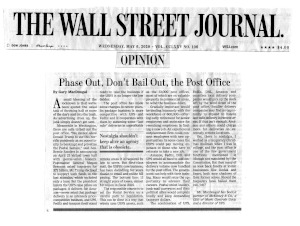The Wall Street Journal
May 5, 2020
By GARY E. MACDOUGAL
Phase Out, Don’t Bail Out, the Post Office
Nostalgia shouldn’t keep alive an agency that is obsolete.

A small blessing of the lockdown is that we’ve been spared the usual task of throwing half or more of the day’s mail into the trash. As advertising dries up, the junk simply doesn’t get sent.
Meanwhile in Washington, there are calls to bail out the post office. “We cannot allow Donald Trump to use this horrific pandemic as an opportunity to bankrupt and privatize the Postal Service,” said Sen. Bernie Sanders in announcing an April 21 virtual town hall with postal-union leaders. Postmaster General Megan Brennan asked taxpayers for $75 billion. Mr. Trump declined to support such funds in the last stimulus, which included only a loan. But the president insists the USPS raise prices on packages it delivers for Amazon—never mind that package delivery is an intensely price-competitive business, and UPS, FedEx and Amazon itself stand ready to take the business if the USPS is no longer the low bidder.
The post office has made some changes in recent years. Its package business is more competitive with UPS and FedEx and it cooperates with them by assuming some “last mile” deliveries in unprofitable remote areas it is required by law to serve. But first-class mail, the USPS’s core business, has been dwindling for years thanks to email and online bill paying. The bottom line: 13 straight years of losses, almost $9 billion in fiscal 2019.
The responsible course is to set the Postal Service on a careful path to liquidation. This can be done in a way that wisely uses USPS assets, such as the 31,000 post offices, most of which are on valuable property in commercial areas, to wind the business down.
Crucially important would be dealing humanely with the workforce of 600,000—offering early retirement for senior employees and assistance for remaining employees in finding a new job. An experienced outplacement firm could connect employees with new opportunities. In some cases the USPS could pay moving expenses to those who have to relocate to take a new job.
Amazon, FedEx, DHL and UPS would all need to add employees to accommodate the delivery volume now handled by the post office. The government can help with their training. Many would seize the opportunity to advance their careers. Postal-union leaders, junk-mail purveyors and their political allies would complain loudly and keep demanding taxpayer dollars.
The combination of UPS, FedEx, DHL, Amazon and countless local delivery companies would pick up the slack left by the wind-down of the post office. Smaller delivery companies may find an opportunity to expand to handle last-mile delivery in remote areas. If that isn’t enough, Amazon and others could charge more for deliveries to extremely remote locations.
Yes, there is nostalgia. I worked as a temporary Christmas mailman when I was in college, and the post office is one of the few government functions mentioned in (though not mandated by) the Constitution. But then many of us look back fondly at iconic businesses like Kodak and Sears, both now shadows of their former selves. Should the taxpayers have bailed them out, too?
Mr. MacDougal has been a partner of McKinsey & Co., a CEO of Mark Controls Corp. and a director of UPS.
Appeared in the May 5, 2020 print edition.